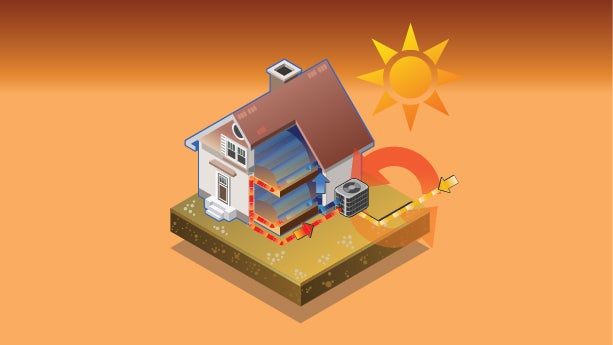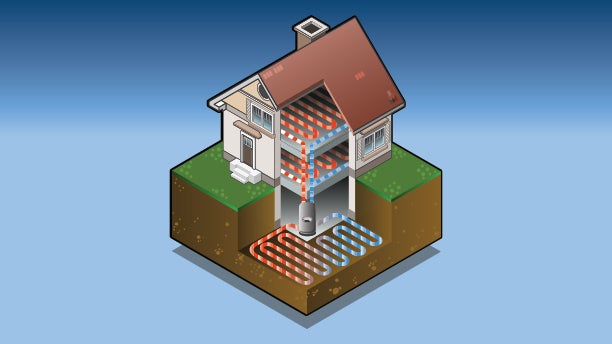Advanced Heating & Cooling Systems
With more than 55 percent of annual household energy expenses attributed to heating and cooling, energy experts recommend heat pumps because they are the most economical way to keep your home comfortable year-round. Choosing an energy-efficient heat pump is the best purchase you can make for your home. In fact, a heat pump is an ideal heating and cooling option for almost any building.
A heat pump is basically an air system with a reversing valve. These systems use electricity to move the heat found naturally in the air or ground to keep your home or business comfortable year-round. During the cooling season, a heat pump moves warm air out of your home creating a cool indoor environment just like an air conditioner. During the heating season, a heat pump extracts warm air from outside or beneath the ground and moves it into your home.
Before you purchase a heat pump for your home, read here about how to hire a contractor.
United Power members can receive incentives for upgrading to efficient electric heat pumps for heating and cooling.
Heat Pump Rebates
Rebates effective Jan. 1, 2026
Mini-Split Heat Pumps:
Cold-climate/high efficiency, retrofit only
- ≤ 2 tons — $250
- > 2 tons — $500
Ducted Air Source Heat Pumps:
Cold-climate/high efficiency, retrofit only
- ≤ 2 tons — $500
- > 2 tons — $1,000
Ground Source Heat Pumps:
- Replacement only (≤ 4 tons) — $500
- Replacement only (> 4 tons) — $1,000
Rebate Details
Equipment Requirements:
- Minimum: 1 ton (applies to all heat pumps)
Air-Source Heat Pump minimum: 1 ton, HSPF2 ≥ 8.5 non-ducted / HSPF2 ≥ 8.1 ducted & SEER2 ≥ 15.2. - Please check with United Power’s Energy Solutions team for details on HSPF2/SEER2 rating requirements before making any purchases.
- Ground source heat pumps must also meet Energy Star EER and COP ratings, which can be found here.
- Rebates not applicable to new construction projects.
Program Requirements:
- You must receive permanent electric service from United Power to qualify.
- Applications must be submitted within 90 days of installation.
- An invoice detailing equipment brand, model number, and itemized pricing for equipment and labor costs is required with rebate application.
- AHRI certificate required.
- Two pictures: the first a close-up of the equipment faceplate label with model number, serial number, voltage, etc., and the second from several feet back for a full view of the installation.
- Submission of application does not guarantee rebate.
- United Power reserves the right to inspect equipment installation.
- Limit one unit rebate per member per rolling 12-month period.
- Rebates in this category will be issued as a check. Allow six to eight weeks for rebate processing.

Air Source Heat Pumps
The most common type of heat pump system is the air-source heat pump. An air-source heat pump moves heat to and from the outdoor air.
On the outside, an air source heat pump looks exactly like a conventional air conditioner, but the difference is found on the inside with a reversing valve which allows a heat pump to provide a high level of year-round comfort for your home or office.
In summer, a heat pump operates just like a conventional air conditioner. Much like a refrigerator, a heat pump moves heat from the inside to the outside to create a cool environment. Because they move heat rather than generate heat, heat pumps can provide up to four times the amount of energy they consume.
In winter, a heat pump will reverse itself to heat the inside of your home when outside temperatures are as low as 40°. Your gas furnace will serve as a supplemental heat source when outside temperatures are lower than 40°-greatly reducing gas heating expenses.
In Colorado, 55 percent of all heating fuel is used when temperatures are 42° or warmer. Running a heat pump instead of a furnace can result in typical savings of $25 to $50 per month on overall heating costs.

Geothermal Heat Pumps
Ground-source, or geothermal heat pumps, take advantage of the earth’s relatively constant temperature to efficiently heat and cool your home or office. Geothermal heat pumps circulate water through plastic pipe buried underground. Water in the pipes acts as a ‘vehicle’ to move heat. The pipes are closed, so water is not deposited into the ground, only the heat it is carrying. In the summer, heat pumps cool by extracting heat from inside, carrying it through the system, and transferring it beneath the earth’s surface. In the winter, the system reverses itself by collecting heat from the ground and carrying that heat inside.
The Environmental Protection Agency considers geothermal heat pumps the most energy-efficient, environmentally clean, and cost-effective space conditioning system available. Currently installed systems are making a huge difference in our environment. The systems are eliminating more than three million tons of carbon dioxide, which is the equivalent of taking 650,000 automobiles off the road. Geothermal heat pump systems conserve energy and, because they move heat that already exists rather than burning something to create heat, they reduce the amount of toxic emissions in the atmosphere.
Geothermal heat pumps save money, both in operating costs and maintenance costs. Investments can be recouped in as little as three years. There is a positive cash flow, since the energy savings usually exceeds payment on the system. The initial investment for a geothermal heat pump system is greater than that of a conventional system. However, when you consider the operating costs of a geothermal heating, cooling, and water heating system, United Power’s rebates and the energy savings of the system quickly offset the initial difference in purchase price.
Resources
Geothermal Heat Pump Consortium
International Ground Source Heat Pump Association
U.S. Department of Energy Efficiency & Renewable Energy
U.S. Department of Energy: Energy Star®

